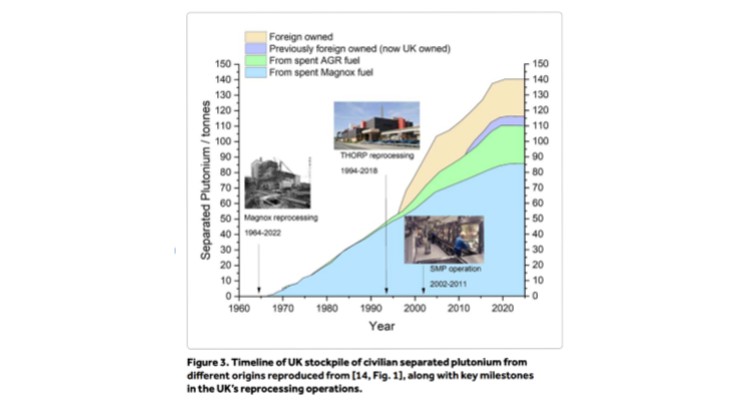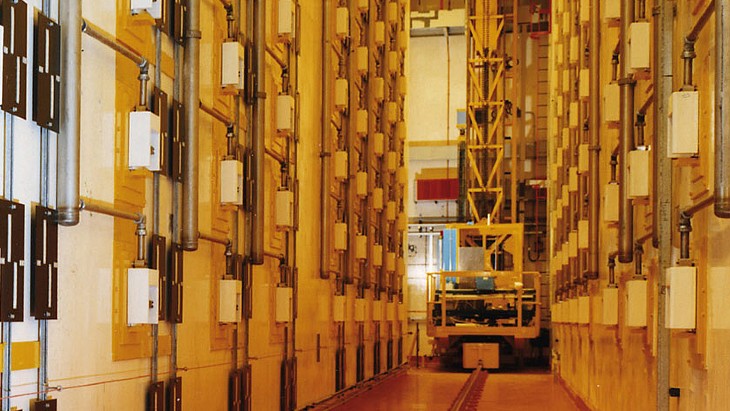The report, Managing the UK plutonium stockpile: No easy choices, says that over the past six decades the UK has built up the largest stockpile of civil plutonium in the world, which is currently stored at Sellafield as plutonium dioxide powder. It says that the Nuclear Decommissioning Authority (NDA) is carrying out an improvement programme over the coming decades of the facilities, packaging and storage.
However, it adds: "After the period of storage, the end point of the plutonium is being examined against the possible futures of conversion into either fuel for nuclear reactors or a wasteform for disposal in the planned UK geological disposal facility (GDF)."
It says that as nuclear fuel, the plutonium "would generate quantities of low-carbon energy, the amount of which would vary with the reactors and fuel types used but could be very significant for the UK. As waste, no energy would be generated, but this option could be expected to reach an earlier end point than use as fuel and to involve less initial cost as part of the overall GDF programme".
The report says its "key initial finding is that the current programme of improvement at Sellafield is essential to reduce the risks and hazards of plutonium storage, and this must be a priority for resources and funding over the next several decades. This unavoidably long timescale allows time for the choices between 'use' and 'disposal' to be properly examined: essential when any choice will almost certainly exclude any later move to another choice. Time is, however, a consideration, when the storage of plutonium dioxide powder is more hazardous than storing the same plutonium as a reactor fuel or as a wasteform. This will need to be clearly factored into decision making, especially when the desire to minimise hazard/risk appears to be taken as an absolute driver in some quarters".
Among its 10 recommendations, the report says there needs to be a national dialogue allowing stakeholders on all sides to share their views in an evidence-based debate; the current programme of repackaging and storing the plutonium inventory in optimal conditions must be carried out by NDA and Sellafield Ltd to the currently programmed end point of 100-year design life storage; the hazard represented would be greatly decreased by conversion from dispersible powder into a solid form and government should ensure that a comprehensive assessment is carried out on the attributes and costs of the range of options and, because the different options have different pathways to putting plutonium beyond reach, government needs to develop a full understanding of the whole plutonium lifecycle for each pathway before committing to irrevocable decisions.
The report does not select one specific option, but its overall recommendation is that the UK government "should acknowledge that this is an unavoidably complex, multigenerational undertaking, requiring ongoing stewardship prior to an irrevocable decision on the end point for the material, and should put in place suitable arrangements. There are significant major uncertainties which can only be managed through a long term, programmatic approach with continuity, flexibility, adaptability, underpinned by Research, Development and Innovation commensurate with the scale of the challenge".

Standard operation of nuclear power reactors produces plutonium from the use of uranium-238 in nuclear fuel and much of the UK's used fuel was subsequently reprocessed but with the plutonium separated for future use, the report says, "mainly with the intention of eventually utilising it to start generation using a future programme of fast reactors" but "the economic and resource drivers for the adoption of fast reactors did not materialise, and the UK’s plutonium inventory remains stored".
The report notes that the current commitment to reaching net-zero carbon emissions by 2050 means that the plutonium "could have a significant role in both generating low-carbon energy, and in facilitating the huge energy potential of the UK’s stock of depleted uranium (which becomes a viable energy source in fast reactors in partnership with plutonium)".
In his foreword to the report, Professor Clint Sharrad, acting director of the Dalton Nuclear Institute, says that successfully delivering on the use of plutonium for one of the fuel options "could power the UK for centuries" but "would take time, money, organisation and commitment ... and it may be that extracting the energy from UK plutonium in the not-too-distant future becomes unnecessarily expensive and political barriers may be too difficult to overcome. Therefore, it might be simpler and cheaper to consider it a waste material alongside the other legacies from the nuclear industry, and safely dispose of it. So there are some decisions to be made. Some need to be made soon, whereas others can, and should, be safely postponed until we have the necessary supporting information".
Sharrad adds: "To paraphrase the common saying about building new nuclear reactors, the best time to begin such conversations is around twenty years ago - but the second-best time is now."







_55401.png)
_23009.jpg)






